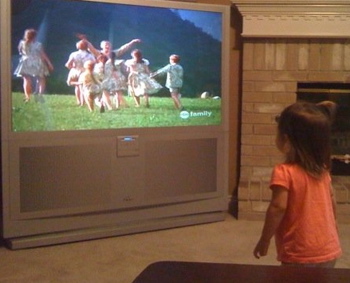Maybe Some Television is Okay for Toddlers and Preschoolers
 How much television is appropriate for a toddler or a preschooler to watch in one day? Over the last 2 years on The Mom Crowd we have had many discussions about new preschool television shows and inappropriate content in movies, but we haven’t discussed how much TV is okay. I bet that a lot of us let our kids watch more TV than we care to admit.
How much television is appropriate for a toddler or a preschooler to watch in one day? Over the last 2 years on The Mom Crowd we have had many discussions about new preschool television shows and inappropriate content in movies, but we haven’t discussed how much TV is okay. I bet that a lot of us let our kids watch more TV than we care to admit.
My husband and I have discussed how much television we will allow our 2 year old daughter, Annabelle, to watch. While discussing the issue we both agreed that we both watched a lot of television growing up and we turned out okay. We were both fit kids and didn’t grow into slothful adults. So for now we are not terribly strict on the amount of television our toddler watches.
The truth is that I need help sometimes. Dora the “Sitter” helps me out a lot for when I need to shower, make dinner, or clean up the house. Frankly, I don’t think I could have transitioned to having 2 children over this past summer without Dora. While I nursed, snoozed a little, or dealt with a fussy baby PBS, Noggin, Disney morning shows were available.
This Summer was one of the hottest Summers ever recorded in Texas history. When the temperatures hit over 100 degrees for 50+ days in a row, you can’t go outside. While we were house bound this past Summer I was more lenient with TV watching. As the weather cools down we will be able to go outside more often and the need for television’s help will decrease. Additionally, she goes back to Mother’s Day Out twice a week in the Fall, limiting her TV watching even more.
When Annabelle can safely entertain herself and I can reason with her about her activities, then maybe I will be more limiting. Unfortunately (for my productivity) my daughter does not play well by herself. She gets bored and needs me or another friend in the room with her. She has inherited her parent’s extremely extroverted genes. It is not practical for me to play with her all day long. Instead of limiting TV to an hour a day, I try to spend an hour or two without the TV on with my little one.
We don’t let our toddler watch anything. There are certain Nickelodeon and Disney shows that she isn’t allowed to watch and I still fast forward certain parts of movies. Although, I am anxious for Annabelle to fall in love with movies, because I love family movie nights with popcorn.
When my daughter turns into a couch potato while watching TV and can play by herself without a lot of supervision, then I will revisit my TV time rules. For now I am not being too hard on myself about how much TV my daughter watches. And I don’t think other moms should be so hard on themselves either.
Did you watch a lot of TV growing up? Are you strict on the amount of TV you allow your preschooler to watch? Are you thankful when you can get a break courtesy of Noggin?
Share the fun: Email + Del.icio.us + Digg + Technorati

 “Don’t worry about anything; instead, pray about everything. Tell God what you need, and thank him for all he has done. If you do this, you will experience God’s peace, which is far more wonderful than the human mind can understand. His peace will guard your hearts and minds as you live in Christ Jesus.” ~ Philippians 4:6-7
“Don’t worry about anything; instead, pray about everything. Tell God what you need, and thank him for all he has done. If you do this, you will experience God’s peace, which is far more wonderful than the human mind can understand. His peace will guard your hearts and minds as you live in Christ Jesus.” ~ Philippians 4:6-7 We all know that children pick up everything they hear. When we converse, my hubby and I are constantly spelling key words, finding creative synonyms, or using parental code. It is a hoot to watch my daughter listening with all her might. She reminds me of myself when I am listening to people speak a foreign language I’ve vaguely studied – I know every sixth word or so. When she does follow us, she jumps in with questions and responses. She’s quick, that girl.
We all know that children pick up everything they hear. When we converse, my hubby and I are constantly spelling key words, finding creative synonyms, or using parental code. It is a hoot to watch my daughter listening with all her might. She reminds me of myself when I am listening to people speak a foreign language I’ve vaguely studied – I know every sixth word or so. When she does follow us, she jumps in with questions and responses. She’s quick, that girl. I recently read Nina Planck’s book
I recently read Nina Planck’s book  There comes a time in every family’s life that you change churches for one reason or another.
There comes a time in every family’s life that you change churches for one reason or another.
